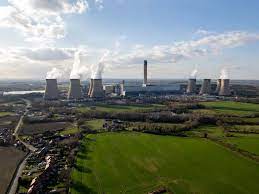Green campaigners have said that they fear that ministers are poised to award billions of pounds in fresh subsidies to Drax power station, despite strong concerns that burning trees to produce electricity is bad for the environment.
Drax burns wood to generate about 8% of the UK’s “green” power, and 4% of overall electricity. This is classed as “low-carbon” because the harvested trees are replaced by others that take up carbon from the atmosphere as they grow.
But many studies have shown that wood burning harms the environment, by destroying forests, and because of the decades-long time lag between the immediate release of carbon dioxide CO2 from burning and the growth to maturity of replacement trees.
Drax currently receives billions of pounds in subsidies from energy bill payers, at the rate of about £2m a day according to Greenpeace, but these are scheduled to run out in 2027. A government decision on whether to continue the support payments beyond the cut-off could come as soon as Monday.
Read also: Analysis shows over 100,000 homes in England could be built in highest-risk flood zones
Campaigners fear that ministers could allow Drax unrestricted subsidies for continuing to burn biomass, which one said would be “incredibly bad news”. A further option would be to impose strict time limits on the subsidies, or require Drax to use carbon capture and storage (CCS) technology, which could reduce the harm to the climate but still allow widespread destruction of trees.
Awarding new subsidies to Drax would be highly controversial among Labour MPs. The Guardian has seen letters from parliamentarians sent to the Financial Conduct Authority and the Financial Reporting Council, querying Drax’s claims to environmental sustainability.
Several peers and at least one MP have asked the financial regulators to open an investigation into Drax, based partly on findings from the energy regulator, Ofgem, that the company had misreported data on the origins and sustainability of imported wood pellets.
Research last month from the green thinktank E3G found the government could meet its target of decarbonising the UK’s electricity sector by 2030 without Drax.
Matt Williams, senior advocate for the Natural Resources Defense Council, called the Drax decision a crucial test of the government’s green plans. “If [ministers] award business-as-usual subsidies, that would be incredibly bad news for forests, and anyone who cares about them. Billions more for the UK’s single largest polluter would make it clear the government was placing all its bets on high-carbon infrastructure,” he said.
Story was adapted from the Guardian.
